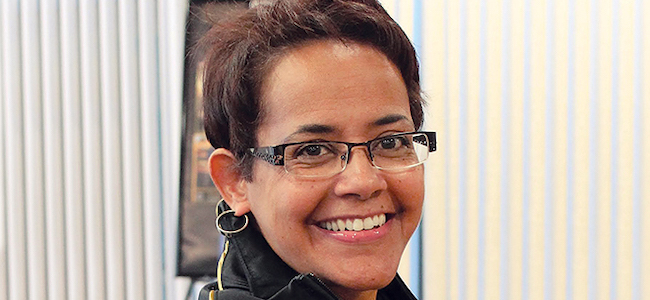Film Interview: RoxFilm’s Lisa Simmons — Embracing Cinematic Independence
By Tim Jackson
“It is wonderful to see the variety, diversity, and the opportunities for Black artists to tell their stories and present themselves in ways that are not ‘traditional.'”
 The past year has been a difficult one for film festivals. The dedication of directors and organizers has kept fests alive by offering films online for extended viewing periods, often with post-screening interviews. Still, there is nothing like the ambience and conversations generated by a group viewing films on the big screen with full sound — and no pause button. We’re now seeing the rise of the hybrid festival — films are available both online and live. From June 17 through 25, the 23rd Roxbury International Film Festival is offering this kind of setup. The proceedings will open with How It Feels To Be Free, a profile of the careers of Lena Horne, Abbey Lincoln, Diahann Carroll, Cicely Tyson, Pam Grier, and Nina Simone. I spoke with Lisa Simmons, the director of RoxFilm, about this year’s festival and what looks to be a promising new world for Black filmmakers.
The past year has been a difficult one for film festivals. The dedication of directors and organizers has kept fests alive by offering films online for extended viewing periods, often with post-screening interviews. Still, there is nothing like the ambience and conversations generated by a group viewing films on the big screen with full sound — and no pause button. We’re now seeing the rise of the hybrid festival — films are available both online and live. From June 17 through 25, the 23rd Roxbury International Film Festival is offering this kind of setup. The proceedings will open with How It Feels To Be Free, a profile of the careers of Lena Horne, Abbey Lincoln, Diahann Carroll, Cicely Tyson, Pam Grier, and Nina Simone. I spoke with Lisa Simmons, the director of RoxFilm, about this year’s festival and what looks to be a promising new world for Black filmmakers.
Arts Fuse: The past year has seen a significant increase in stories and representations of people of color in books and film as well as in a number of remarkable series on subscription cable. Is this interest reflected in the kind of films you are seeing?
Lisa Simmons: Things have definitely changed. Access to equipment and to distribution has really changed the game. You see a lot more people being able to use the medium, to do more writing, even coming up with plays. Technology now enables artists to make films on an iPhone. In general, the fact that cameras are less expensive is an important reason for the increase. Also, the world has changed. There are more stories of people of color. People want to educate themselves and independent film is a way to do that. There are stories being made now that you wouldn’t necessarily see in the mainstream media.
AF: With so much activity, has curating the festival become more difficult?
Simmons: In the beginning it was so easy. (Note: the festival began as the Dudley Film Festival in 1998.) Today, people are telling incredible stories, collaborating with great directors, producers, and cinematographers. Does it make my job more difficult? Absolutely. And it’s painful! There are films I would still like to squeeze in. At first, the offerings are broken up and seen by committees. Then we come together and watch everything.

Lisa Simmons, RoxFilm’s director.
AF: This year’s festival features a number of films about art and artists of color.
Simmons: We are opening with How It Feels To Be Free and closing with the Alvin Ailey film, Ailey. These are films that celebrate Black art and the importance of understanding its history. Black artists weren’t just artists: they were also political in their personal lives, often fighting for civil rights. They continue to do so today. There is a free outdoor Juneteenth screening for the documentary Summer of Soul, which is so good I could watch it over and over. There is the film Fresh Guide to Florence with Fab 5 Freddy, a look at Black art and Renaissance art and the way that Black people were depicted in Renaissance paintings. There is also a panel on animation. You see more and more Black and Brown communities working in that field to tell their stories. We’re putting a lot of focus on women, as well as Black women. There will be an online conversation with BIPOC (Black, Indigenous, People of Color) Women Independent Filmmakers about navigating the independent film world.
AF: Will the hybrid festival model have an influence going forward?
Simmons: Yes. I think there needs to be an opportunity for the hybrid model going forward. There’s room for that. I will say, though, that it tends to be a little more difficult to deal with premieres because festival films are Geo-Blocked. (A technology that restricts access to Internet content based on the user’s geographical location.) And being online means that you are challenged to come up with interesting things to do with panel commentators, coming up with fresh new angles in which to talk about a film. We started a Film and Thought panel years ago to consider how we can go beyond the conventional Q & A when a movie’s theme concerns social justice. We were asking what else can we do to deepen a film’s impact and its relationship with the audience.
AF: I see there are a a variety of offerings online, organized by theme.
Simmons: We are, once again, doing script readings with local actors. Because these pieces will be shown online, the actors can be located anywhere. There is also a section on Black films with a horror theme. And, as always, there will be a strong selection of locally themed films, both features and shorts.
These days, with so much being offered by museums and festivals, it is wonderful to see the variety, diversity, and the opportunities for Black artists to tell their stories and present themselves in ways that are not “traditional.” That’s important. There is now a strong diversity across all kinds of genres, from film to music to art.
Tim Jackson was an assistant professor of Digital Film and Video for 20 years. His music career in Boston began in the 1970s and includes some 20 groups, recordings, national and international tours, and contributions to film soundtracks. He studied theater and English as an undergraduate, and has also has worked helter skelter as an actor and member of SAG and AFTRA since the 1980s. He has directed three feature documentaries: Chaos and Order: Making American Theater about the American Repertory Theater; Radical Jesters, which profiles the practices of 11 interventionist artists and agit-prop performance groups; When Things Go Wrong: The Robin Lane Story, and the short film The American Gurner. He is a member of the Boston Society of Film Critics. You can read more of his work on his blog.
